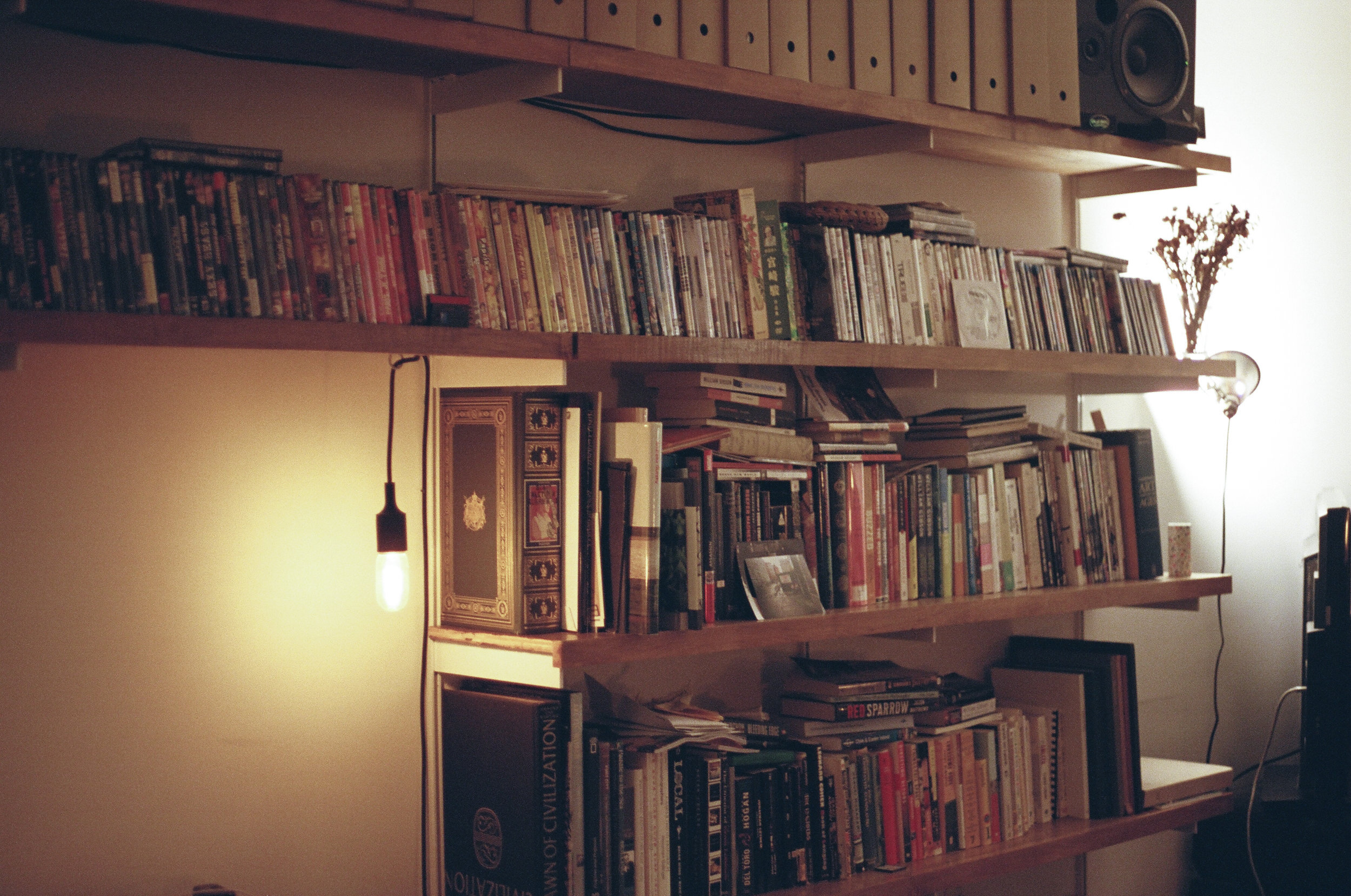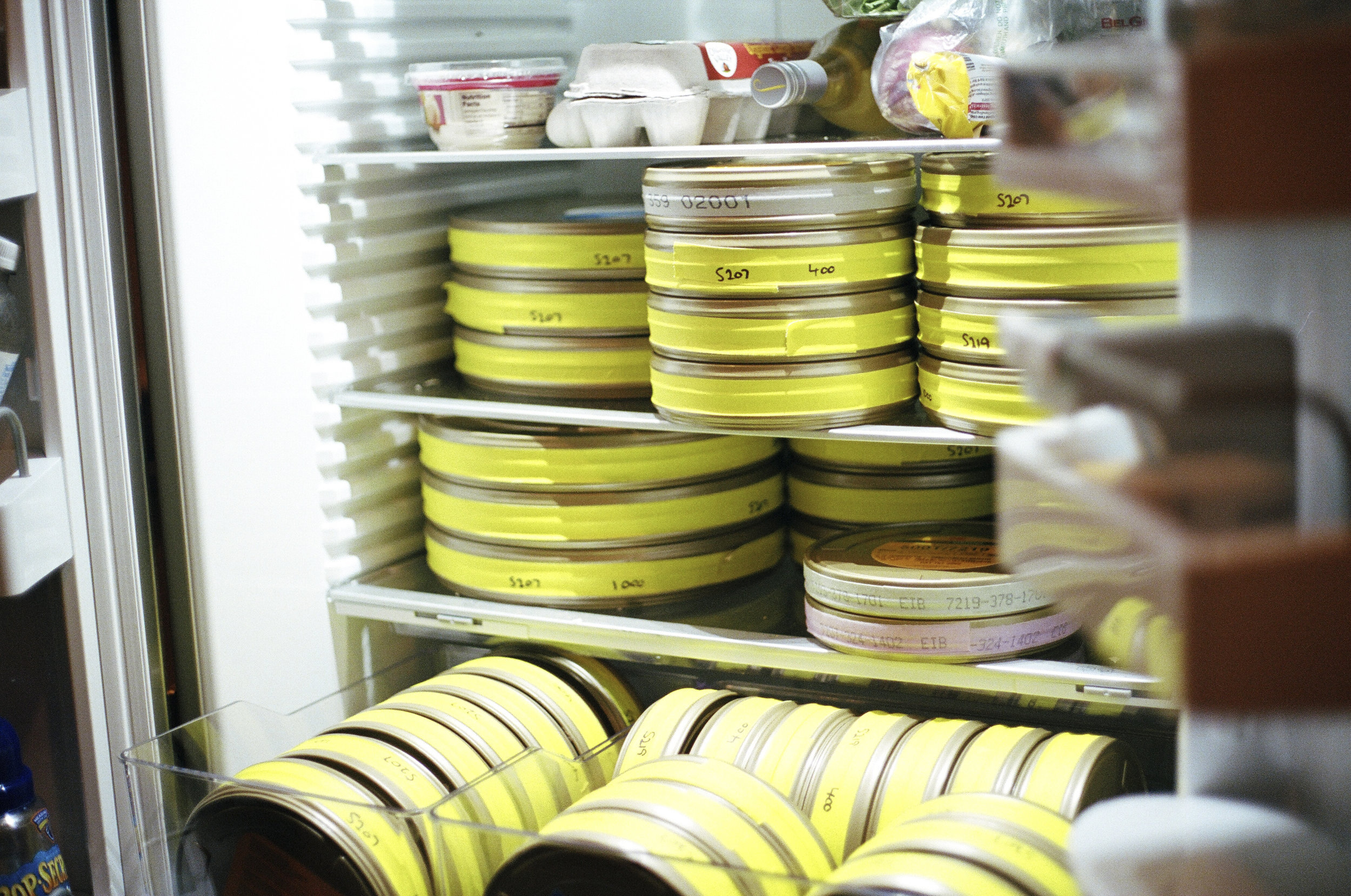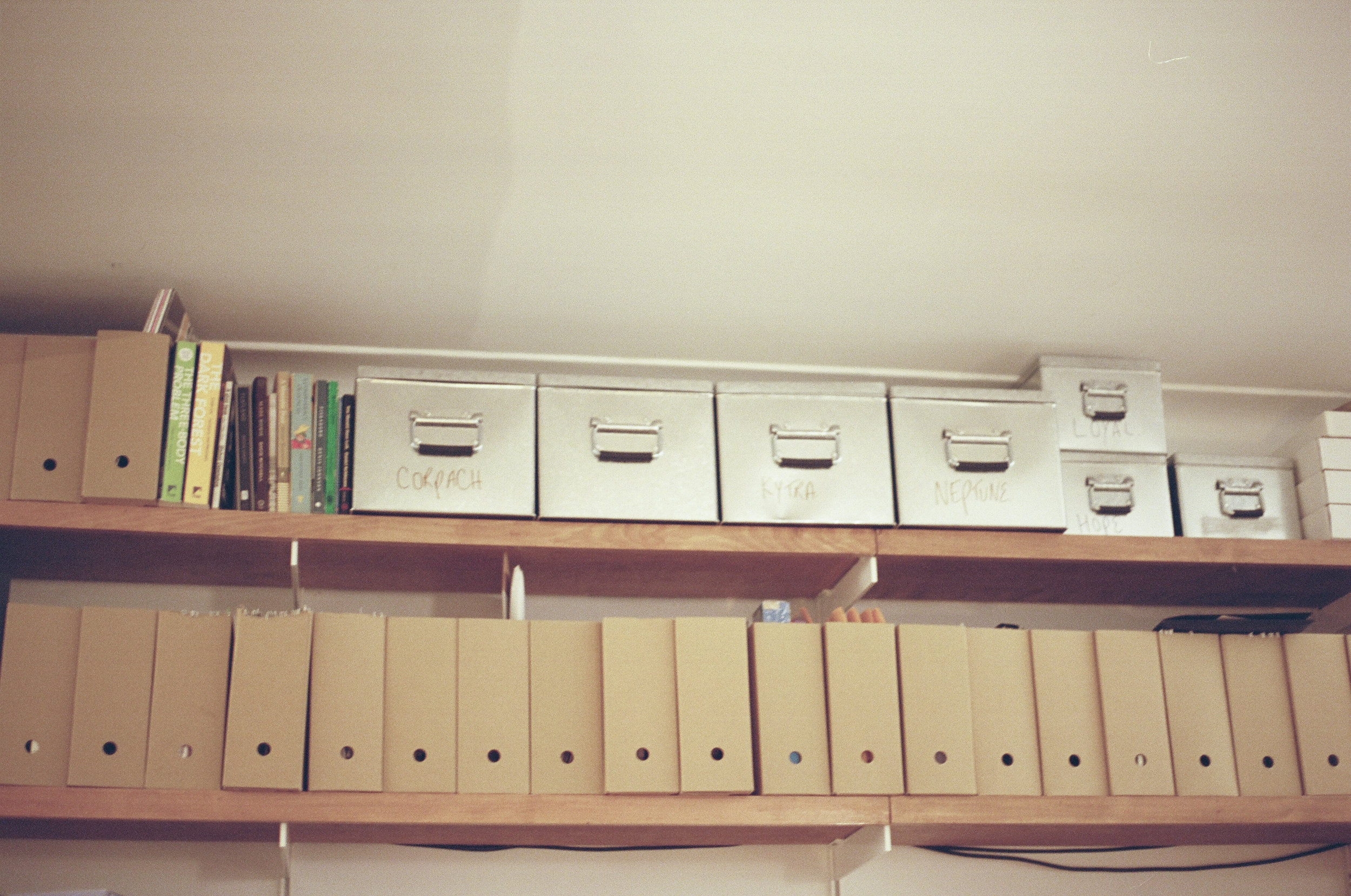Anne Hollowday
I met Anne Hollowday at the door to her apartment building on the Lower East Side. She was just arriving from work and, hopping off her bike, offered me a hug before opening the door and leading me up the stairs to her second-floor apartment. The bike rack in the entryway was clearly utilitarian, but (at least to my eye) could double as a piece of art. The whole apartment is, in fact, quietly beautiful, from the long wooden shelves filled with books, DVDs and negatives to the triptych calendars made by a friend of hers. Our conversation wove between our immediate surroundings, her first trip abroad (Iceland), our experiences of photographs as storytelling devices, the West Wing, and her art.
When we settled down by a window overlooking the complex's courtyard, I asked her about her work. Hollowday is a filmmaker, and her professional work is usually writing content and shooting commercials. When we talk about the line between professional and personal work, she clearly sees a distinction.
The building is pre-WWII, one of the coops built by garment workers in the tenement districts in an effort to improve housing conditions. Photo courtesy of Anne Hollowday
“I make my living as a filmmaker, doing commercials and writing content. So my artistic work is quite separate in a way. They each inform the other, obviously, because even when you’re a practicing commercial creator and creative, you are exercising the same skills and analytical thinking and kind of creativity. But it’s informed by a certain set of expectations and framework. So I like to live very much outside of that in my personal life.”
Working in commercials and doing her own thing on the side is what has given Hollowday so much freedom to explore and experiment.
“Everyone always says to me, 'Wouldn’t you want to be an artist full time?' and yeah, obviously, totally, that’s everybody’s dream. But then, you know, you meet artists, and you’re like…For example, I know this person who’s a painter. He’s sort of a painter, he’s sort of like a sculptor slash painter. And he is very much an artist, an independent artist, and he makes work and he sells the work and he’s doing very well. But then I was like, what’s the difference, really, between you and me and all my filmmaker peers who are doing commercials, it’s sort of the same thing. He’s making work more "for himself," I guess, but then actually when you talk to him about it, he’s like, 'You know I’ve got to make work that sort of fits within these kinds of boundaries, within this frame, so people will buy it,' and he needs to make sales in order to continue making more work, in order to buy more materials, and to get a reputation.
"So then, actually, we all exist in this world, and you know, it’s totally fine for all those things to coexist, I would never want to make a sort of value judgment on what’s better, morally or not. I think commercial work is really great. Because it’s really short time frames and often a lot of money; it’s about how big and great an idea is, and there are so many skills involved in trying to sell someone an idea. Then someone gives you a lot of money, and you're like, Shit I better do this, rather than like, Oh I have three years but no money, but limitless amounts of time and creativity. Sometimes that’s paralyzing to some people. Really, it’s all about how do you choose to spend your time and can you motivate yourself enough to do something.”
There’s very little that Hollowday won’t just go do. She’s been travelling since she was a teenager, which has had a strong hand in forming her as an artist and a person.
“A year and a half ago, January 2017, I did a train trip across country, cause I’ve always wanted to, I’ve always romanticized train travel. I did travel by train through Vietnam. But I wanted to connect the dots, you know. And that was five days, on a train from LA to New York. If you do it, make sure you get like a little room, a little cabin.”
“Did you not?”
“No, I did, I did from LA to Chicago. Chicago to New York I didn’t, so I had a whole overnight, like 21 hours sitting in a chair which is not fun. But in the room, it’s amazing. I could be like that for days. I could just constantly stay on the move.”
Anne can use this camera one-handed while she's on the move. "But I'd probably go both hands on the camera, no hands on the bike if I were to do that."
From the other room, Hollowday brings out a stack of cards, greeting cards. They’re simple and white, with a single, uneven line pressed across the front. On the back is a set of coordinates. Hollowday explains that this was one of the products of her cross-country train trip. She’d done sketches of the horizon line in different parts of the country, and the coordinates on each card corresponded to where that horizon line could be found.
"I’m a very visual, aesthetic person. And very textural.
“Texture bleeds into everything. I’m the person who wants to touch everybody’s fabrics, and touch random plants and things. That has inspired my love of film and analog photography, and film—analog filmmaking too.”
All of my work is informed by that. Some sense of motion, even in very still photography, and a textural, sensorial sense of the world. That’s a preoccupation of mine, and something I’m trying to explore in all of the work I do.
I know I have tons, like years and years worth of negatives hidden away. Like my husband jokes I’m sort of like Vivian Maier, which obviously, is a nice..I’m congratulating myself by giving myself that kind of level—But I don’t talk about my work, I don’t share my work very often.”
When I asked her about how she organizes the film, Hollowday can’t help but smile a bit. A few moments later, she’s pulled up the most comprehensive organizational excel document I’ve ever seen. Her scans are always backed up on multiple hard drives, stored in multiple locations while the physical negatives are carefully labeled and organized into boxes. When she was young, a lot of photos and family documents had been lost in a fire, and clearly, that memory had a lasting effect. Her excel sheet organizes the files by location, keyword, event, and people she was with. It’s massively impressive.
Finally, I asked her how she takes breaks, and find out she’s been reading a book a week every week for the past three years, this year upping it to two books a week, which is apparently dramatically harder.
“It’s hard because you literally have to choose to do it. You know, you have the time, but you have to choose to spend it doing that. And so, I thought a book a week taught me that but two books a week really does. A book a week, there was a touch and go moment on New Year’s Eve last year, where I was like, I’m not gonna make it! But then I read two books in a day and I was like, alright cool I can do it.”
“If I’m at the office, taking care of the orchids.”
The orchids were actually how I was first introduced to Hollowday. She’d reached out, asking if we’d be interested in running a little story on her orchid caring, and I’d shot back with, how about a full-length interview?
“Orchids require so much specific lighting, that at my office we have like, a lot of direct sunlight in the morning, and so...orchids don’t like too much direct sunlight but a little bit is good. And then the sun kind of comes around the building, so they get indirect sunlight the rest of the day, and it’s really warm and moist in this one room, I keep all of them in there, so it’s become my greenhouse....I don’t know if [everyone else in the office] loves it, everyone else is like, ‘I kill plants, I don’t want to be in charge of anything,’ and I’m like, ‘I don’t kill plants, so I’ll take care of them.’
“Everybody I meet, they like hear, or they see photos, and they’re like, ‘Oh, what do I do about my orchid?’ And I’m like, ‘Just bring it to me, and I’ll nurse it back to health and when it flowers again I’ll bring it back to you, or...send me a picture and I’ll tell you what to do.’ And you don’t have to do a lot, but there’s a few very specific things at a few very specific times, and if you don’t do it then...you’ll fuck up the orchid for like a year. And have the patience! Honestly, have the patience to see it through, but if you don’t, then, give to me and I will.
“So I think everybody sort of indulges me that, when they’re sending a message or an email, they’ll be like, ‘Oh I tried sending you a chat—oh, you’re taking care of the orchids.’
“You need to find the things that like, fill you up again. I find, I really do find that like, cycling does that for me, and taking care of the orchids. And photography, like in a really deep way, but only when I’m doing it, for me. And, reading. They all really give me that."
Photography has been a nearly lifelong passion for Holloway who got her first camera from her father.
“My dad gave me his AE-1—he always shot with that, that was his camera, until, maybe the year 2000 and then he got given another camera, which was at the height of 35 mm film, just before digital, he got this other camera that was a gift and so he gave his AE-1 to me, and he taught me how to use it and I just learnt, and I studied that and did my own sort of, dark room processing and printing. And just loved that. For me, that is where I’ve returned to later in life. When I was 18, I was like oh, I want to get a digital camera because everything’s digital. What a terrible mistake that was, just terrible. When I turned 30, my mum was like what do you want as a present, and I was like, I almost want the camera I should have asked for when I was 18, and I should have probably asked for a Hasselblad or something...But I didn’t, I didn’t, I just bought it myself. Well, I bought it for my husband, for his 30th birthday. We’ve got two. One’s broken right now. They break.
“And the secret is to try and find those things.”
“I think the greatest secret is if you can figure out how to spend your time, and how that is for you. How to spend your time in a meaningful way...it’s not about even efficiency, it’s about meaning.”
I think, as you get older. Like I at least for me I found myself like enjoying certain things more than I ever thought I would, and having a sort of preoccupation with like things like the orchids right, like I never thought I would be into that.
“And then being able to sort of find your people. And everybody says that that will happen but I have actually found that to be true. And the more you realize the things you’re interested in, you sort of hold that as truth for you. As you find your people, you’re not as much of a tumbleweed anymore. You feel, at least I feel, direction. Not like you’re moving towards something. I’m not trying to go anywhere. I don’t even know what that end goal would be to me, but my steps are assured.”
Check out Anne’s films: Common Structure and Bird Watching.






